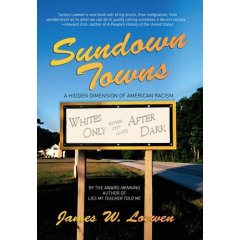Sundown Towns
 Could television’s South Park and Springfield be cartoon sundown towns? I would like to think so. Is there a yet to be documented trend of upper-class single mothers “of color” facing terrorism in racist suburbs all across America? Doesn’t the phrase “of color” eerily resemble that ‘old’ word “colored”? None of these questions are answered in James W. Loewen, his new book Sundown Towns: A Hidden Dimension of American Racism.
Could television’s South Park and Springfield be cartoon sundown towns? I would like to think so. Is there a yet to be documented trend of upper-class single mothers “of color” facing terrorism in racist suburbs all across America? Doesn’t the phrase “of color” eerily resemble that ‘old’ word “colored”? None of these questions are answered in James W. Loewen, his new book Sundown Towns: A Hidden Dimension of American Racism.
Laura Wexler of the Washington Post actually reviewed the book and she writes,
With the rise of the automobile, among other things, came the birth of sundown suburbs. In 1909, Loewen reports, Chevy Chase, Md., became one of the nation’s first after the owner of the Chevy Chase Land Company sued a developer to whom it had sold a parcel of land because of rumors that he planned to build affordable housing for African American workers. The company ultimately prevented the development, and the land sat vacant for decades before becoming home to Saks Fifth Avenue, its current resident. No doubt, the owner of the Chevy Chase Land Company would approve of the suburb’s current racial makeup; in 2000, Loewen writes, “its 6,183 residents included just 18 people living in families with at least one African American householder.” But even that isn’t white enough anymore, Loewen charges: Whites are increasingly fleeing nearly all-white suburbs for lily-white exurbs, adding sprawl to the already numerous economic, psychological and sociological tolls of residential segregation.
This book is a reminder for those millions of Americans that believe in magical existentialism—that my existence ‘in the ghetto’ came from vacuum-packed inferiority wafting in the ether. It takes a nation of millions to hold me back. This book delves into a few technical details of how this is done. In order to appeal to the default egocentrism of the majority of Americans, it would be great to find that the book shows an influence that “sundown towns” have on housing costs for all Americans.
At bottom, the colored family with strong African features will have to keep fighting to find a place as a token extra in the white sit-com of suburban life—or we will have to fight the ghetto. Success in either path will mean white backlash. However, winning in the ghetto means saving the world while winning in the white sit-com means playing yourself as a character created by white folks for white folks. Ha. Ha. Ha.
